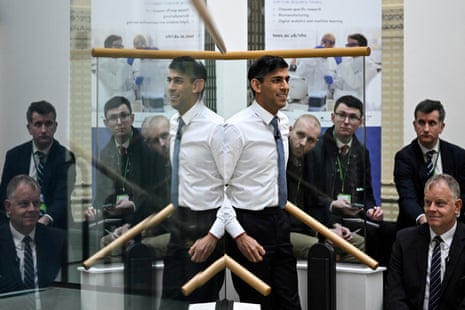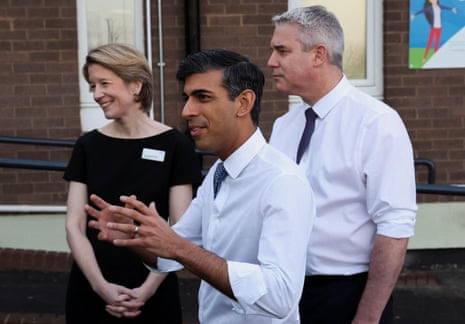Sunak claims he acted 'decisively' over Zahawi and says he wants to 'move on'
Sunak is now taking questions from the media.
Beth Rigby from Sky News goes first.
Q: Today you are not even recommitting to get back to the 18-minute waiting time target for ambulances. Why not?
Sunak says the current waiting times are unacceptable.
But he says the NHS has faced unprecedented pressures. The flu crisis was the worst for years.
He says he wants to get waiting times down to 30 minutes this year, and down to pre-pandemic levels later.
He says he thinks the January figures will show things are already starting to improve.
Q: You are talking about the NHS. But your tenure in government has been more about sleaze than sound government. Are you furious about Nadhim Zahawi?
Sunak says he followed the process. He has an independent adviser, he asked the adviser to get to the bottom of the facts, and he took a decision on the facts.
He says this relates to things that happened before he became PM.
He says he acted “decisively” so that people could “move on”, which is “what I think all of you deserve”.
Key events
Q: To staff all these extra beds, you will need more staff. Will you review the rules that determine what people like nurses are and are not allowed to do?
Sunak says that is a very good question. The government is reviewing this, he says.
He says doctors need to be confidence that “virtual wards” can be safe.
The government has a “great plan”. But it has to deliver it, and part of that involves ensuring that staff can deliver it, and that restrictions don’t stop them doing what is needed.

Q: I’m a senior partner in a GP practice. The bureaucracy for GPs is increasing. Can you reduce it?
Sunak says he discussed this at his recovery forum in Downing Street recently. The royal college made some suggestions. The government is looking at them.
He says it is helpful for him to hear from doctors like the questioner what the problems are.
Sunak says the proposals in the urgent care plan announced today to increase the use of “virtual wards” will be “transformational”.
Sunak says NHS workforce plan will increase number of places in medical schools
Q: A Policy Exchange report a few weeks ago called for an increase in places at medical school. Will that be part of your NHS workforce plan?
Yes, says Sunak. That is what the government needs to do.
It needs a long-term approach.
Here is the Policy Exchange report. Wes Streeting, the shadow health secretary, spoke at the launch where he pointed out that Labour has already set out ambitious plans to expand the number of NHS training places availabe.
Sunak says it will be 'awful for all of you' if government fails to bring down inflation
Q: What are your plans for rebuilding hospitals like the University Hospital of North Tees in Stockton, the one you visited this morning? And when will you pay nurses properly?
Sunak says the NHS capital spending budget is the biggest ever. Almost 100 hospitals are being upgraded. And there is the 40 hospital programme, he says, which involves builds and rebuilds.
(He does not describe this as the government building 40 new hospitals – which was the misleading description used by Boris Johnson for the programme.)
On pay, Sunak says the government has followed the pay review process.
He says asking why nurses cannot be paid more is “a fair question”.
But, referring to the topics covered by earlier questions, he says there are many other demands on the money.
He can says the NHS is getting more money than before. “Overall the pie is as big as it’s ever been.”
But, within that they have to balance the needs of pay against other needs, like more MRI scanners.
And Sunak says he does not want to put people’s taxes up.
He also says his priority is to halve inflation.
If inflation is still high in a year’s time, it will be “awful for all of you”, he says.
Q: There are 1.5m people with learning disabilities, but only 17,000 learning disability nurses. What can you do improve that?
Sunak says the government is going to legislate to change the way people with learning disabilities and autism are treated. He says the prevalence has gone up. He says he wants to ensure young people get the help they need. That will come out later this year, he says.
Q: Will you put more funding into pharmacies. And will you consider a national pharmacy first scheme?
Sunak says he is biased in favour of pharmacies, because his mum ran one.
He says he would like to move towards a pharmacy first model.
By 2025 or 2026, all pharmacies should be able to prescribe, for example for urinary tract infections (UTIs).
But he says the medical officers want to ensure this does not lead to too many antibiotics being prescribed, because over-prescribing can lead to people building up immunity to them.
UPDATE: Sunak said:
A lot of pharmacists have said to us, whether it’s for UTIs or minor ailments, will it be possible for pharmacies to do more – and that’s why we’re actively looking at things like regulation, and antibiotics.
And also if we have more pharmacies doing blood pressure checks, for example, that will get people the treatment they need earlier and stop ambulance callouts.
The first question comes from a woman who asks if the government will do more to help nursing students. She says some are really struggling, and dropping out.
Sunak says the government restored bursaries for student nurses.
He says a workforce plan will be published soon.
And he says the government will do more to give NHS staff continuous career development.
This is from the Daily Express’s Martyn Brown.
Sunak says urgent care plan will lead to 'largest and fastest improvement in emergency waiting times in NHS's history'
Rishi Sunak began by summarising the NHS urgent care plan announced today.
He said it would lead to “the largest and fastest-ever improvement in emergency waiting times in the NHS’s history”.
UPDATE: Sunak said:
I think we will see – in fact I know we will see – the largest and fastest-ever improvement in emergency waiting times in the NHS’s history.
That is the ambition of our plan that we’ve set out today.
I feel really confident we can deliver it.
Rishi Sunak's Q&A
Rishi Sunak is holding a Q&A in Darlington.
It seems to be following the same format as that used in his first PM Connect event earlier this month – a short speech, questions from the audience, then questions from the media.
Gove says plan to exclude developers from housing market if they don't remove unsafe cladding should release £2bn for repairs
This morning the Department for Levelling Up, Housing and Communities has confirmed details of its plan – publicised by Michael Gove yesterday – to force developers to remove unsafe cladding from tall buildings or face sanctions that would in effect stop them building new homes. In a news release it says:
Developers today received legally binding contracts that will commit them to pay to repair unsafe buildings.
The government has set a six-week deadline for developers to sign the legal agreements and is warning that companies who fail to sign and comply with the terms of the contract will face significant consequences.
Legislation will be brought forward in the spring giving the secretary of state powers to prevent developers from operating freely in the housing market if they fail to sign and comply with the remediation contract …
Under legislation to be brought forward this spring, a responsible actors scheme (RAS) will be created, allowing the secretary of state to block developers who have not signed the contract or failed to comply with its terms from carrying out development and from receiving building control approval. This will prevent them from operating as normal in the housing market for as long as they do not resolve the problems of the past.
The department says this will lead to developers spending an estimated £2bn on cladding repairs or removals from buildings 11 metres high or taller that they developed or refurbished over the past 30 years.
Sunak 'being pulled down' by scandals dating from Johnson era, says George Osborne
Yesterday Steve Brine, the Conservative chair of the Commons health committee, said the Nadhim Zahawi affair showed how the Tories were suffering from “long Boris” because this, and other, scandals originated in events that happened during Boris Johnson’s premiership. It is a terrific phrase, and a variation on the “long Johnson” version used by my colleague Rafael Behr in a column last week (which itself may have been inspired by Robert Shrimsley’s “long populism” column in the Financial Times earlier this month).
George Osborne, the Tory former chancellor, made the same point on the Andrew Neil Show last night. He said:
The big question for the Rishi Sunak premiership was whether his high ratings could pull the Tory party up, or the Tory party’s low ratings would pull him down.
And at the moment he is being pulled down by a series of scandals which do not directly involve him, are hangovers, if you like, of the Johnson era.
Osborne said there were similarities between Sunak’s position and John Major’s in the 1990s.
I was the photocopy boy in Downing Street back in the ’90s when John Major had all these problems. And there are similarities in that John Major was likeable, conscientious, like Rishi Sunak, but ultimately, was not able to escape the downward pull of the Tory party. It’s still ‘we’ll see’ with Rishi Sunak, but he knows that as each week passes, as each new scandal unfolds, the window for action gets smaller and smaller.
Osborne also said that Sunak should do more to show that he was different from Johnson.
To my mind, the defining thing of his political career was his decision to resign as chancellor from the Boris Johnson government over sleaze, over integrity, but he’s never really talked about that.
And we got the very first hint of it at prime minister’s questions this week where he started to say, ‘I resigned from the Johnson government’. I think you’re going to hear a lot more of that. I think he’ll have learned lessons even from the Zahawi affair, that you need to act more quickly than he did – and I think that he’s going to try and define himself now as ‘the sleaze buster’, but it’s extremely hard.

Rishi Sunak has praised NHS workers who have pioneered a new system to manage the flow of patients through their hospital, PA Media reports. PA says:
Sunak joined the health secretary, Steve Barclay, and the NHS chief executive, Amanda Pritchard, on a visit to the University Hospital of North Tees in Stockton, Teesside.
They visited the hospital’s integrated coordination centre, a hub which manages patients coming in and out of the hospital and links up with community teams to help them be discharged, freeing beds.
Talking to accident and emergency staff, Sunak said: “It’s a model we need to make sure we can do more of across the country.”

No need for Nadhim Zahawi to step down as MP, insists minister
Nadhim Zahawi has been sacked from his post as Conservative party chair, which came with a government job as a minister without portfolio in the Cabinet Office, but that is not enough for some opposition parties. The Liberal Democrats say he should stand down as an MP. In a statement this morning Daisy Cooper, the Lib Dem deputy leader, said:
Nadhim Zahawi failed to pay the taxes he owed, refused to come clean, and then threatened campaigners and journalists with legal action simply for trying to uncover the truth.
It shows that Zahawi is simply not fit to represent his constituents in parliament. If he refuses to stand down as an MP, Rishi Sunak surely has no choice but to withdraw the Conservative whip.
Even some of Zahawi’s colleagues think he should leave parliament. Sir Geoffrey Clifton-Brown, the treasurer of the backbench 1922 Committee, told Radio 5 Live last night that Zahawi ought to stand down at the next election.
The best outcome is if Nadhim Zahawi did not stand at next election - Tory Treasurer of 1922 Committee Sir Geoffrey Clifton Brown on Nolan @bbc5live
— Stephen Nolan (@StephenNolan) January 29, 2023But this morning Helen Whately, the social care minister, said there was no need for Zahawi to quit parliament. Whately was the government representative on the morning media round and, as my colleague Peter Walker reports, she said it was for Zahawi’s constituents to decide if he should continue to represent them.
Rishi Sunak to hold Q&A as Zahawi's allies claim he was sacked unfairly and Labour says 'many questions' still unanswered
Good morning. It was widely predicted that Nadhim Zahawi would lose his job as Conservative party chair after the investigation into his tax affairs, but I don’t think anyone in the Westminster politico-media world was expecting a sacking at 9am on a Sunday morning. Normally that’s a dead zone for No 10 announcements. The timing seemed contrived to imply decisiveness, and to show that Rishi Sunak was taking the initative.
But the departure of Zahawi has not stopped the opposition, and others, criticising Sunak’s handling of the affairs. The story has moved to the “raises questions about his judgment” phase of scandal coverage and Labour has written an open letter to Sunak with a string of as-yet unanswered questions. It says the scandal “leaves many unanswered questions”. Here is the letter.
This hopelessly weak Prime Minister has been dragged kicking and screaming into doing what he should have done long ago.
But the Nadhim Zahawi tax scandal leaves many unanswered questions for Rishi Sunak. @AnnelieseDodds and I have written to the PM today. 1/2 pic.twitter.com/OanjCzSyYz
Rishi Sunak’s account doesn’t add up - and now he needs to set the record straight. How was Nadhim Zahawi able to breach the Ministerial Code SEVEN times? The PM must come clean on what he knew and when. 2/2 pic.twitter.com/DFv7GOxugr
— Angela Rayner 🌹 (@AngelaRayner) January 29, 2023Conventiently, Sunak will be answering questions this morning. He is doing a Q&A in the north-east of England this morning where some of this is bound to come up.
But it is not just Labour asking questions about the process. Zahawi is said to be furious about his treatment, and Steven Swinford in the Times says Zahawi is considering publishing his own response to the Sir Laurie Magnus report into his tax affairs, which he considers flawed. Swinford says:
Zahawi is said to be furious and believes he has not been given the chance to put his case across. He had one 30-minute meeting with Magnus last Wednesday and only saw details of Magnus’s report when it was published on Twitter.
Allies of Zahawi have disputed Magnus’s timeline. Magnus says that Zahawi failed to inform the Cabinet Office of the settlement he reached with HMRC until January. Those close to Zahawi claim that he did so in September, before his appointment as chancellor of the Duchy of Lancaster by Liz Truss and as chairman of the Conservative Party by Sunak.
They say he has text messages and emails to support his claim, which he is said to have shown to Magnus. Zahawi is also said to have been infuriated by the manner of his dismissal shortly before 9am on a Sunday morning. Zahawi was still sending material to Magnus on Saturday night and was given half an hour’s notice that he was being fired.
“It’s an outrage, the timing is deliberate and brutal. He had a half-an-hour meeting on Wednesday in which he gave his side of things and that was it. People deserve their right of reply. A response to the report is a possibility.”
The Daily Telegraph and the BBC have both had similar briefings.
The Spectator has published a list of its own questions for Sunak, based on the premise that Zahawi did not get a fair hearing.
Today Sunak wants to talk about plans he is announcing to commission thousands of extra hospital beds and hundreds more ambulances to cut A&E waiting times by next winter. But the din of scandal means he is not getting the hearing he wants either.
Here is the agenda for the day.
After 9.30am: Rishi Sunak does a Q&A in the north-east of England, after visiting a hospital.
11.30am: Downing Street holds a lobby briefing.
2pm: The National Education Union holds talks with Gillian Keegan, the education secretary.
After 3pm: Peers debate the report stage of the public order bill.
After 3.30pm: MPs debate the remaining stages of the strikes (minimum service levels) bill.
I’ll try to monitor the comments below the line (BTL) but it is impossible to read them all. If you have a direct question, do include “Andrew” in it somewhere and I’m more likely to find it. I do try to answer questions, and if they are of general interest I will post the question and reply above the line (ATL), although I can’t promise to do this for everyone.
If you want to attract my attention quickly, it is probably better to use Twitter. I’m on @AndrewSparrow.
Alternatively, you can email me at andrew.sparrow@theguardian.com

 1 year ago
76
1 year ago
76










 English (US)
English (US)